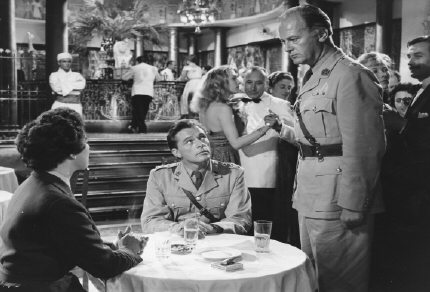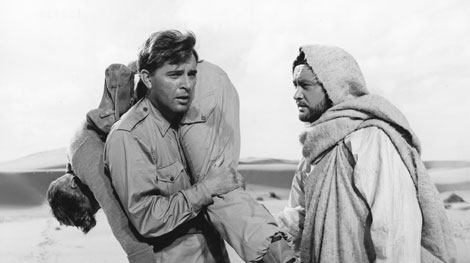
SECOND CHANCES
christopher funderburg
NICHOLAS RAY: Part IV
Despite their reputations, some films and filmmakers just don't do it for the writers of The Pink Smoke. This series, Second Chances, follows Funderburg and Cribbs in their attempts to find greatness where they've previously failed to see it; to actively make an effort to appreciate esteemed artworks for which they currently have a distaste (or feel indifference). They'll give cult favorites like Let the Right One In another shot and dig deep in the filmographies of beloved auteurs whose appeal baffles them (like Nicholas Ray) - and with a little luck, maybe they'll even emerge as newly-minted fans...
<< click here for Nicholas Ray: Part I >>
<< click here for Nicholas Ray: Part II>>
<< click here for Nicholas Ray: Part III>>
Bitter Victory

Well, why didn't you tell me that the ol' Wisconsin hack had made a "rag-tag squad on a suicide mission behind enemy lines" movie?* Itís even takes place during a north African campaign in WWII like my favorite rag-tag suicide squad flick, Play Dirty. Andre de Toth also only had one eye! Rag-tag suicide squad! Thwarting Rommel! One eye! This has to be great, right?! Short answer: it is. It's fucking great. Richard Burton stars as the fey, heretofore office-bound Captain Jimmy Leith, second in command to the glowering Aryan Major Brand (played by the excellently named Curd Jurgens Ė good work, Mr. and Mrs. Jurgens) on the aforementioned north African suicide mission. Their mission: go undercover as Arabs, bust out the submachine-guns, mow down some Krauts, smash up Rommel's HQ and abscond with some very important "documents." As in Johnny Guitar, there are shades of Casablanca: the gorgeous Leith and the severe Brand have their relationship complicated by their romantic histories with the same woman, a French servicewoman played by Ruth Roman. Leith left her in London long ago and then Brand married her just before the war broke out.
While at its core a romance, Roman is shuttled off-screen fairly quickly and spends almost the entire film on the sidelines. The majority of the movie follows Brand and Leith's squad through the aftermath of their mission. The assault on Rommel's HQ is great, but it's all over very quickly. There's a short, effective suspense set-piece as the disguised commandos take their places around the Arab town and get into the position for the raid; while the raid itself is a great bit of brutal action filmmaking, the type of blunt, stylistically subdued set-piece that simply isn't made anymore. The action on-screen is presented without affect, no shaky-cameras or quick-cutting or reduced shutter-angles or even hyper-active tracking shots: the action itself is enthralling in its own right and a passive camera only adds the harsh, invigorating immediacy of the tone. The whole sequence (set-up and raid) couldn't last more than ten minutes and then the rest of film follows the squad on their arduous trek through the desert to the appointed rendezvous point.
If the raid goes off without a hitch, of course the escape is going to be where the plans go all to hell. The crew suffers enemy patrols, missing camels, possibly poisoned wells, sore feet, sandstorms, scorpion attacks, dead Arab guides, scheming Nazi colonels. To top it all off, Leith witnessed an act of cowardice on Brand's part during the raid and lords it over him constantly as their petty emotional back-and-forth becomes the predominant characteristic of the escape portion of the mission. The two men engage in tit-for-tat retributive acts of psychological torture, with the uncertain status of the Frenchwoman's love as the nexus of their face-off. The film can best be summed up as two men who hate themselves trying to get their opponent to feel an even deeper self-loathing: it's a race to the bottom of human dignity fueled by cowardice, jealousy and malignant regret.

The key scene - an absolutely intense, devastating bit - follows after Brand commands Leith to stay behind with two injured soldiers and wait for reinforcements to pick them up. The assignment is bunk: no one is going to come for him out in the desert, so he has two choices: die of dehydration or put the injured men out of their misery and move on. The scene is worth too much to be spoiled by a summary, but it sends Leith and Brand's antagonistic relationship careening past the point of no return and, from that moment on, you know that one of them is not making it out of the desert alive. The only questions are who can sink further and quicker into the moral morass: Brand or Leith? And what will the Frenchwoman feel for the one who returns alone? Leith's weapon of choice is hyper-articulate philosophizing; he's another one of Ray's intellectual bullies and he uses his verbal dexterity and intellectual prowess to push Brand to the brink of total mental breakdown. For his part, Brand has military authority and an impressive craven recalcitrance at his disposal. And every time the deck feels stacked in one direction or the other, the unpredictability of the battlefield reshuffles the cards.
It wouldn't be illogical to label Bitter Victory pretentious, but it slips that noose by having Burton's character be an incorrigible intellectual - sure, his speeches about the nature of cowardice in love and war as well as his penchant for self-serious rhetorical proclamations followed by meaningful pauses are frequently borderline embarrassing (and, by the end of the film, dramatically clanky), but that's just the type of guy Jimmy Leith is. Asking Jimmy Leith not to windily pontificate on the psychological shortcomings of Major Brand even while wandering behind enemy lines in harsh desert conditions is like asking the scorpion not to sting - it's just what they do. And the film really does follow this rule pretty well: nobody but Burton gets to be a grandiloquent bore. Leith's high-faultin' oratories are obnoxious and tedious, but why shouldn't our hero have that weakness? A hero without failings is rarely compelling and self-seriousness is a common flaw amongst Ray protagonists, so Leith at least fits the profile. All things considered, he's a lot less irritating than James Dean in Rebel Without a Cause or "Pretty Boy" Nick Romano.
* I donít really have anything against the guy, but I just wish Quentin Tarantino would keep his smirking, condescending mitts off of my favorite sub-genres. Wuxia pian familial revenger? Bank heist flick? If he adapts a Parker book next, Iím outta here. OUTTA HERE! At least I hate Vanishing Point and Dirty Mary, Crazy Larry, so no harm there.
<<Previous Page 1 2 3 4 Next Page>>
home about contact us featured writings years in review film productions
All rights reserved The Pink Smoke © 2009